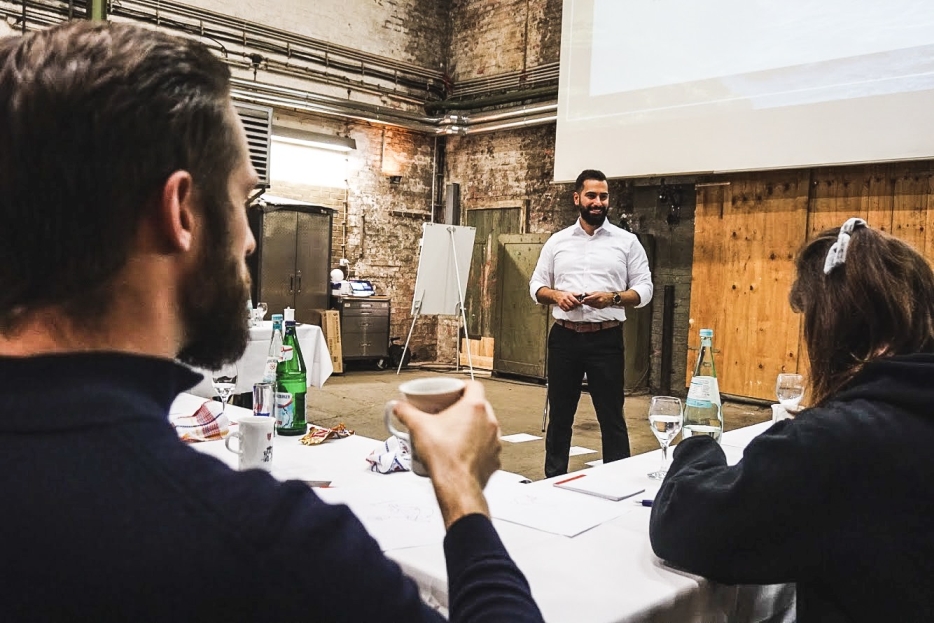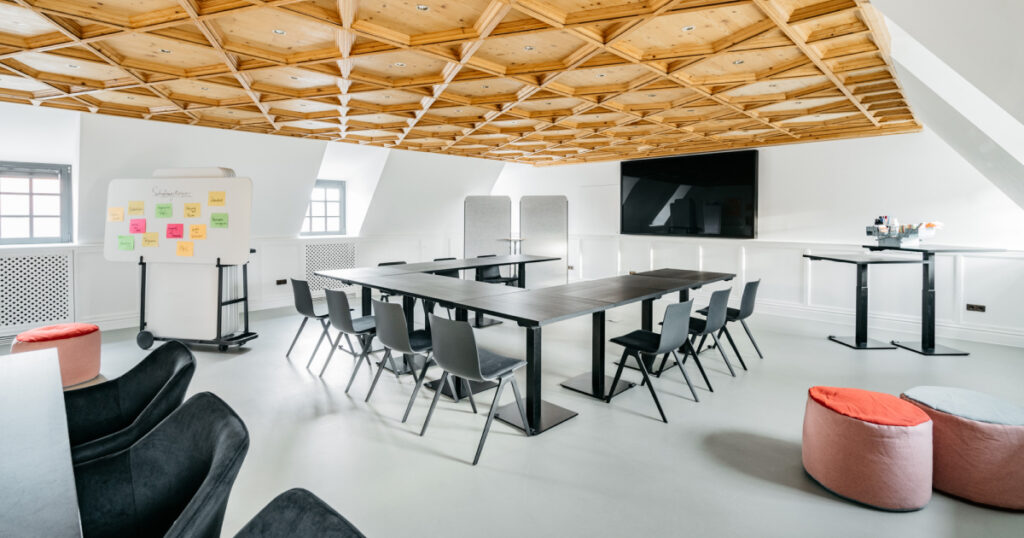The most important facts in brief
- The kick-off meeting starts the project, defines goals and strengthens team spirit
- A clear agenda, timely invitations and functioning technology are essential
- Introductions, goals, roles and feedback promote focus and collaboration
- Inspiring location, clear communication and participant involvement ensure success
Are you about to launch your next big project? Then now is the perfect time for an inspiring kick-off meeting in a unique location! Bring your team to a place that sparks motivation and creativity. Whether in a flexible workspace with a minimalist design or in a “cocooning” room with a feel-good atmosphere – a well-planned kick-off creates the ideal basis for your joint success.
Here you can find out everything you need for a kick-off meeting that strengthens team spirit and clearly defines your project goals. From the essentials to the right agenda and practical tips: With this checklist, your kick-off will be a perfect project launch that gets the whole team involved. Let’s kick it off!
What is a kickoff meeting? – The starting signal for your project
A kick-off meeting is more than just a starting signal – it is the experience that unites your project team and sets the course for successful collaboration. This is where everyone involved comes together to agree on common goals. In a creative environment where innovation and exchange take center stage, you avoid misunderstandings and ensure that everyone is on the same level of knowledge.
Kickoff meeting essentials – definition and purpose that count
A kick-off meeting is your compact project launch with a clear focus on goals and methodology, while a kick-off event focuses more on motivation and team building. An inspiring event format can be ideal for larger projects – perhaps as a multi-day retreat with team-building activities, outdoor meetings and surprising moments that bring the team together.
Kickoff event vs. kickoff meeting: What makes the difference?
While a kick-off meeting marks the official start of a project, a kick-off event serves more to promote a spirit of optimism and motivate the project team. Larger projects are sometimes launched with a large-scale kick-off event that can last several days. For most projects, however, a compact kick-off meeting is sufficient to discuss all the important steps and define the objectives.
|
Aspect |
Kick-off meeting |
Kick-off event |
|
Purpose |
Project start, define goals, plan steps |
Promoting motivation, creating a spirit of optimism |
|
Duration |
Usually a few hours to 1 day |
Often several days |
|
Participants |
Project team, stakeholders, client |
Larger group of people, including external guests |
|
Agenda |
Focus on goals, steps, methodology |
Inspiring program, team-building activities |
Goals of a kick-off meeting – strengthening vision and team spirit
A well-planned kick-off meeting is the key to a successful project launch. It brings the entire project team together to understand the vision, define goals and strengthen team spirit.
Communicate project goals clearly and define success
A kickoff meeting has a clear mission statement: make project goals transparent and define joint success! This is about setting measurable, achievable and relevant goals that motivate the team and focus on a common result. A goal such as increasing customer satisfaction by 5% in the next 6 months is a strong example – concrete, inspiring and tangible for everyone. With clear objectives, the entire team can maintain focus and work in the same direction. This way, the kick-off is not just a starting signal, but a real framework for success!
Get to know your team & distribute roles smartly – the perfect start for your team spirit!
A kick-off meeting is the perfect opportunity to create a real spirit of optimism and get the team on track! It’s not just about discussing the project plan – it’s about inspiring and motivating everyone involved. By emphasizing the benefits of the project and focusing on the team spirit, you ensure that everyone starts with full energy and motivation. An inspiring kick-off not only clarifies content and roles, but also gives the project the push it needs to achieve great things together. With a well thought-out framework and a dose of team spirit, your project will be on the road to success!
|
Goal |
Description |
|
Communicate project goals |
Set measurable, achievable and relevant goals |
|
Increase team motivation |
Emphasize the benefits of project participation and strengthen team spirit |
|
Distribute roles |
Clarify responsibilities and create communication channels |
A successful kick-off meeting lays the foundation for trust and team spirit. It is about creating a culture of mutual respect in which clear roles and responsibilities are defined and each team member feels their importance to the bigger picture. An effective kick-off focuses on achievable project goals and promotes the emotional commitment of the team – because when everyone pulls together, team morale remains high and performance consistently strong. This sets the project on the road to success right from the start, with a team culture that shines through credibility and cohesion.
Preparing and planning the perfect kick-off meeting
A kick-off meeting with the wow factor is the key to your project’s success! It lays the foundation for smooth collaboration and ensures that everyone involved is on the same page right from the start. To make your kick-off a success, careful planning and organization are essential.
Invite participants smartly and brief them in good time
For a truly effective kick-off, it is crucial to have the right people on board. This includes the project lead, the core team, the client, relevant stakeholders and any external consultants. Invite these key players in good time and make sure they have all the information they need to attend the meeting fully prepared.
Clever time and format planning
The duration of your kick-off depends on the complexity of the project and the number of participants. As a rule, plan between 2 and 8 hours – for particularly large projects, it may make sense to hold several kick-off sessions to ensure the best possible start to each project phase.
Get equipment ready and carry out a technical check
To avoid technical mishaps during the kick-off meeting, it is advisable to carry out a thorough technical check in advance. Make sure that all the necessary equipment such as a screen, projector, conference room equipment, video camera and microphone are available and in working order. Also test the internet connection and the compatibility of the various systems, especially if you are working with external partners.
|
Preparation step |
Description |
|
Set goals |
Define clear objectives for the kick-off meeting to ensure focus and efficiency. |
|
Determine participants |
Invite all relevant stakeholders to avoid misunderstandings and ensure alignment with the project goals. |
|
Create agenda |
Sets the agenda in advance to enable a structured and efficient meeting. |
|
Plan session duration |
Allow sufficient time for the meeting, typically between 2 and 8 hours depending on the complexity of the project. |
A solid preparation of the kick-off meeting facilitates a smooth process and an efficient discussion of the key points. Use the opportunity to build relationships between the various parties involved and create trust. This way, you will start the implementation of your project through the kick-off meeting motivated and full of energy.

Procedure of the kick-off meeting – step-by-step to success
A well-structured process is the key to a successful kick-off meeting. This kick-off lays the foundation for a project and should be carefully planned. By taking the right steps, you can ensure clarity, motivation and a common understanding within the team right from the start.
Intro round and present the vision of the project
Start your kick-off meeting with a relaxed get-to-know-you session to immediately create positive vibes and team connections. Then get your team on track: share the vision of the project and discuss the specific goals, framework conditions and timelines. Illustrate important insights such as project scope, organization, available resources and possible constraints – so everyone is well informed. Make sure you leave room for questions, feedback and fresh ideas to actively involve everyone right from the start and set the course for successful collaboration!
Project objectives, framework conditions and timeline at a glance
Next on the agenda is the big picture: present the specific project goals, the most important milestones and the time frame. Give your team a clear overview of all the key facts and visually summarize the planned course of the project. Here you also have the opportunity to discuss available resources and the framework conditions – so everyone knows which tools, budgets and support are available to bring the project to a successful conclusion.
|
Project phase |
Period |
Milestone |
|
Concept |
Week 1-4 |
Requirements defined |
|
Implementation |
Week 5-12 |
Prototype completed |
|
Test |
Week 13-14 |
Error fixed, release granted |
|
Launch |
Week 15 |
Product successfully launched |
Clarify roles and responsibilities in the team
For a smooth workflow, every team member needs to know exactly what their role and task is in the project. Go through the responsibilities so that everyone clearly understands what is expected of them – from the project lead to the individual task areas. Take the opportunity to also discuss tools and methods for project organization and information sharing so that collaboration is smart and efficient.
Obtain questions, feedback and input directly
At the end of the kick-off, there should definitely be room for questions, comments and feedback. Encourage your team to get actively involved and address open points directly. This way, any ambiguities can be clarified right at the start and the team will start the project motivated and with a clear mindset.
Agenda for your kick-off meeting: structure that inspires
An inspiring and clear agenda is the key to aligning the team with the common goals right from the start. Set the right impulses and ensure that everyone starts with energy and clear objectives – for a project that is on course for success right from the start.
Fix important program points and timetable
A kick-off meeting with an inspiring structure is your power start to the project! This is where the foundations for first-class project management are laid. With a smart, motivating agenda, you set the right impulses and put your team directly on course for joint success. The perfect start that releases energy and sharpens the focus on the big goal – this is how you start your project full of drive and with a clear purpose.
|
Program item |
Duration |
Responsible |
|
Welcome and introductory round |
20 min |
Project manager |
|
Project presentation and objectives |
30 min |
Project manager |
|
Team roles and responsibilities |
20 min |
Team leader |
|
Project phases and schedule |
30 min |
Project manager |
|
Questions, feedback and discussion |
30 min |
All |
Define who is responsible for agenda items
Decide in advance who in the team will present and moderate which agenda items – this ensures clear responsibilities and strengthens the commitment of everyone involved. Active involvement promotes a sense of responsibility and team spirit. Make sure that everyone has enough preparation time to contribute their expertise and fresh ideas and really enrich the meeting.
Plan breaks and refreshments to recharge your batteries
A successful kick-off meeting not only needs inspiring input, but also enough time to relax and exchange ideas. Plan breaks where the team can refresh themselves and recharge their batteries. Healthy snacks and refreshing drinks will keep the team spirit alive and concentration at a high level. This is how you find the perfect balance between information, interaction and relaxation – for a motivated team and a powerful project start.

Practical tips for a successful kick-off meeting
A carefully planned and well-executed kick-off meeting is crucial for a successful project start. With the right approaches, you can create a positive atmosphere and motivation in the team right from the start and lay the foundation for smooth collaboration. Here are some practical tips to help you achieve this.
Promote positive vibes and motivation
Start the kick-off meeting with a relaxed and positive atmosphere. Use icebreaker questions or small team-building activities to break the ice and introduce the team members to each other. This creates a sense of togetherness and motivation for the joint project right from the start. According to statistics, interactive workshops encourage the active participation of all participants and keep the energy in the room high.
Timing the kick-off meeting after project planning has been completed
Only plan the kick-off meeting once the project organization and the most important key points have been determined. This allows you to make binding statements about goals, milestones and responsibilities and present the project roadmap at the meeting. According to experts, a detailed agenda and clearly defined project goals are crucial for the success of the kick-off. Also prepare relevant project documents and make them available to the team members.
Further tips for a successful kick-off meeting:
- Invite all key project participants and inform them in good time about the date, location and content of the meeting.
- Choose an inspiring location for the meeting that promotes productivity and creativity.
- Uses visual aids such as presentations or flipcharts to convey information clearly.
- Actively involves all team members, obtains feedback and emphasizes the common goals and next steps.
- After the workshop, summarize the results, agreements and feedback and communicate them to all participants.
With good preparation, a well thought-out agenda and a motivating kick-off meeting, you can lay the foundations for a successful project. Take the opportunity to generate enthusiasm right from the start, build trust and get your team in the right mood for the tasks ahead.
Kick-off meeting: checklist for perfect preparation and implementation
A perfectly planned kick-off meeting is your success booster for the project! With this checklist, you will not only be well prepared, but will also ensure that the meeting makes an impression and inspires your team right from the start.
- Create an agenda: Define the most important points you want to discuss during the meeting. A clear structure helps you to maintain an overview.
- Invite participants: Invite all relevant team members in good time and inform them of the meeting schedule.
- Plan a round of introductions: Schedule time for all participants to get to know each other. This promotes team spirit right from the start.
- Organize the room and technology: Ensures that the meeting room is prepared and the necessary technology is working.
- Provide catering: Provide enough drinks and snacks to create a pleasant atmosphere.
|
Task |
Person responsible |
Deadline |
|
Create agenda |
Project manager |
1 week before the meeting |
|
Invite participants |
Project assistant |
2 weeks before the meeting |
|
Organizing space and technology |
Office Manager |
3 days before the meeting |
|
Provide catering |
Team assistant |
1 day before the meeting |
Also prepare an inspiring presentation that clearly outlines the project goals, milestones and timeline. Don’t forget to identify potential risks and have a plan B.
Conclusion – The kick-off that really gets your project going!
A kick-off meeting is your starting signal for a successful project launch! Here you can bring your team up to the same level of knowledge, spark motivation and ensure smooth collaboration right from the start. Take the opportunity to plan your meeting carefully – your project will thank you for it!
Set clear goals for the kick-off and create an inspiring agenda. Invite all key participants early on and get the project teams on the right track in advance. Check the technology and make sure the meeting space is suitable. At the kick-off itself, bring the project vision, goals, framework conditions and timelines to the table. Clarify roles and responsibilities and get direct feedback from the project teams to encourage commitment.







